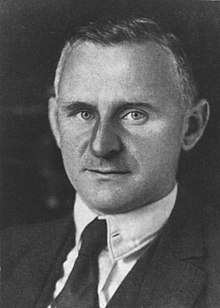Carl Goerdeler
| Carl Friedrich Goerdeler | |
|---|---|
 |
|
| Born |
31 July 1884 Schneidemühl, Province of Posen, Kingdom of Prussia, German Empire now Piła, Greater Poland Voivodeship, Poland |
| Died | 2 February 1945 (aged 60) Plötzensee Prison, Berlin, Free State of Prussia, Nazi Germany |
| Occupation | Politician, civil servant, executive & economist. |
| Known for | One of the leaders of the conservative widerstand movement in Nazi Germany |
| Political party | DNVP |
| Spouse(s) | Anneliese Ulrich |
| Children | 5 (e.g. Reinhard Goerdeler) |
Carl Friedrich Goerdeler (31 July 1884 – 2 February 1945) was a monarchist conservative German politician, executive, economist, civil servant and opponent of the Nazi regime.
Had the 20 July plot to assassinate Hitler of 1944 succeeded, Goerdeler would have served as the Chancellor of the new government. He was executed by hanging on 2 February 1945.
Goerdeler was born to a family of Prussian civil servants in Schneidemühl (Piła), Germany (now in Poland) in the Prussian Province of Posen. Goerdeler's parents were supporters of the Free Conservative Party, and Goerdeler's father served in the Prussian Landtag as a member of that party after 1899. Goerdeler's upbringing was described by his biographer and friend Gerhard Ritter as a part of a large, loving middle-class family that was cultured, devoutly Lutheran, nationalist and conservative. As a young man, the deeply religious Goerdeler chose as his motto to live by, omnia restaurare in Christo (restoring everything in Christ). Goerdeler studied economics and law at the University of Tübingen between 1902 and 1905. Starting in 1911, Goerdeler worked as a civil servant for the municipal government of Solingen. That same year, Goerdeler married Anneliese Ulrich, by whom he had five children. Goerdeler was described as:
Goerdeler's own career had been both impressive and idiosyncratic. He came of conservative Prussian stock with a strong sense of duty and service to the State; his father had been a district judge. His upbringing had been happy, but sternly intellectual and moral; his legal training had pointed to a career in local administration and economics...He was a born organiser, an able, voluble speaker and writer, tough and highly individual; in politics he became a right-wing liberal. Although at heart a very humane man, Goerderler's frigid, spartan belief in hard work and his austere, puritanical morality-he would not tolerate a divorced man or woman in his house-lacked warmth and comradeship. He was, in fact, an autocrat by nature and his commanding personality, combined with his utter belief in the rightness of his point of view, enabled him to persuade weak or uncertain men over-easily to accept his own particular point of view while he was with them
...
Wikipedia
